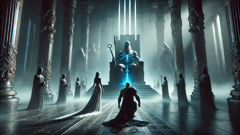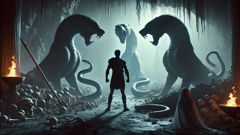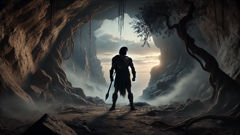Introduction
In the rolling, olive-clad hills of ancient Greece, legends often flickered like torchlight at dusk—never brighter than in the story of Heracles and his twelve impossible labors. His name echoed from the marble columns of Athens to the rugged peaks of Arcadia, a name spoken with awe and a tinge of dread. But even among his feats—slaying the Nemean Lion, capturing the golden Hind, wrestling the Cretan Bull—there was one trial that chilled even the bravest listeners: the descent into the Underworld to capture Cerberus. The mere mention of Cerberus conjured images of terror: a monstrous hound with three slavering heads, a serpent’s tail lashing behind, and eyes burning like embers in the endless gloom of Hades’ realm. Yet, it was not merely the beast that daunted the hearts of mortals. It was the path itself—a journey few living souls had dared or survived. For Heracles, this was not just another labor. It was the final, ultimate test, demanded by King Eurystheus in hopes that even the son of Zeus might finally fail. To snatch Cerberus from the heart of death’s domain required more than brute strength. Heracles would need courage, cunning, and a spirit unbroken by darkness. He would need to face not only physical monsters, but also the shadows of his own soul. As the story unfolds, the world above fades away, and we descend into the spectral depths of Greek mythology—where heroes meet gods, where hope and fear are one, and where, at the gates of Hades, Heracles stands alone against the impossible.
The Command of Eurystheus and the Road to the Underworld
The dawn found Heracles at Tiryns, summoned yet again by the tyrant king Eurystheus. The king, ever eager to find a task Heracles could not complete, greeted him with a twisted smile. This time, his command was simple in word but dreadful in intent: journey into the Underworld itself and return with Cerberus, the monstrous hound of Hades. The court fell silent. Even the seasoned warriors who served Eurystheus shrank back, for none dared speak lightly of the Underworld. Heracles’ features hardened, but he offered no protest. He knew that this, the twelfth labor, would demand more than any feat before. He was not merely facing a beast, but death itself.

The preparations for this journey were unlike any before. Heracles sought the wisdom of the Oracle at Delphi. Pythia, shrouded in incense, told him that the gates to Hades lay hidden in the far south, beyond the city of Eleusis, near the edge of the world at Taenarum. She bade him seek favor from the gods of the dead and respect the customs of the shades. To enter the Underworld alive was a peril reserved for heroes or madmen.
At Eleusis, Heracles underwent purification rites. He fasted for days and bathed in the sacred river, his skin prickling under the cold water as he recited prayers to Demeter and Persephone. The priests anointed him with oil, their voices weaving ancient hymns to shield him from spirits that would claw at his soul. Even so, doubts gnawed at Heracles. He had faced monsters of flesh and blood, but what of ghosts and curses, those unseen terrors that haunted the land of the dead?
His journey led him south along lonely roads. The landscape shifted—fields gave way to wild cliffs, and the wind grew colder as he neared Taenarum, where the sea crashed against the rocks with a voice like lamenting souls. The mouth of the Underworld waited within a cave veiled in mist. As Heracles approached, his heart pounded with a mixture of dread and anticipation. The entrance seemed to breathe, exhaling a chill that curled around his ankles and numbed his hands.
Before stepping across, Heracles knelt and offered libations: honeyed wine for Hades and Persephone, a black ram’s blood poured onto the stones for the dead. The earth trembled. Shadows seemed to gather, whispering promises and threats alike. Club in hand, lion’s skin draped across his shoulders, Heracles entered the gloom. The world above faded away, replaced by utter silence and darkness so deep it pressed against his eyes.
The first challenge came swiftly. In the twisting tunnels, Heracles met the ghostly figure of Theseus, trapped on a stone seat for his hubris in trying to abduct Persephone. The hero’s form was half-substantial, eyes hollow with regret. Heracles, moved by pity and respect for a fellow adventurer, managed to wrench Theseus free from the rock, though a piece of him remained behind forever. In the shadows, the Furies hovered, their faces shrouded by writhing serpents, but they let Heracles pass, perhaps recognizing in him a kindred torment.
With each step, the air grew colder and heavier. River Styx appeared before him—a black, sluggish current separating the world of the living from the dead. Charon, the ancient ferryman, regarded Heracles with suspicion. His eyes, sunken deep beneath a hood, glimmered with greed and wariness. Heracles produced a golden obol, an offering he’d received from the priests. Charon grunted and extended his skeletal hand, ushering Heracles into his creaking boat. The journey across was silent save for the lapping of oily water against rotting wood. Shadows drifted on the banks, murmuring forgotten names.
On the far shore, the landscape twisted further from mortal comprehension. Ashen trees rose from banks of fog, and pale flowers grew among bones. Here, Heracles encountered the shades of those he had known in life—his friend Iolaus, his wife Megara, even his mother Alcmene, each offering words of caution and love. Their touch was cold, their voices echoing as if spoken through water. Grief threatened to overwhelm him, but Heracles steeled himself, promising silently that he would not fail.
Ahead lay the gates to the deepest part of Hades’ realm, guarded by shades and monsters alike. It was here, in this land where hope was a memory and the living were but rumors, that Heracles prepared to face Cerberus and fulfill the impossible command.
Encounters in the Realm of Hades
The Underworld was not merely a realm of death; it was a landscape shaped by memory and myth, teeming with spirits and ruled by gods who cared little for mortal woes. After crossing the Styx, Heracles found himself wandering the asphodel meadows—a grey, endless field where ordinary souls drifted in gentle confusion, each shade pale as moonlight and insubstantial as breath on glass. They passed around him like mist, drawn by the warmth of his living heart, yet unable to touch him.

Beyond the meadows rose the palace of Hades, carved from obsidian and veined with veins of blue fire. At its gates stood spectral guardians: shades of ancient warriors, their armor corroded by centuries. Heracles approached, and the guardians parted before him, recognizing his bloodline and purpose. Within the palace’s echoing halls, the god Hades sat on his throne of shadows, Persephone by his side—a queen whose beauty was tinged with sorrow and strength.
Heracles knelt before them, offering respect and explaining his quest. Hades regarded him with amusement and curiosity. "Many mortals beg for escape from this place," he mused, "but few seek to enter. Fewer still have the courage to demand a prize." Persephone’s gaze was softer, sympathetic to Heracles’ burden and the mortal pain he carried. She whispered to Hades, her voice like wind in autumn leaves. The king agreed to let Heracles attempt the capture of Cerberus—on one condition: Heracles must not use any weapon, nor cause the beast lasting harm. He must subdue Cerberus by strength alone.
Heracles accepted without hesitation, though his heart raced with fear. He thanked the rulers and left their presence, guided by Hermes, the fleet-footed god who could traverse any boundary. Hermes led him deeper into the realm, through groves where poplars whispered of lost hopes and past wrongs. The god offered cryptic advice: “Be wary of what you see and what you remember, for in this place the past is never truly dead.”
Along his journey, Heracles encountered more denizens of the Underworld. He met Sisyphus, eternally pushing his stone up a hill, sweat and despair mingling on his brow. Heracles paused to offer words of comfort, but Sisyphus merely grunted, fixed in his torment. Nearby, Tantalus reached endlessly for water that receded from his lips—a reminder of desires forever denied. These visions weighed on Heracles, reminding him of the cost of pride and the pain of unfinished stories.
As he pressed on, a chorus of voices rose from Tartarus—a prison within the Underworld where titans and monstrous criminals were bound in chains of fire and darkness. The cries chilled Heracles to his core, but he kept his gaze forward, refusing to let fear master him. At last, the air grew heavier, rank with the scent of sulfur and rot. The path narrowed until it became a tunnel lined with jagged stones. At its end loomed a gate made of bones and shadow. Here, finally, Heracles stood at the threshold of Cerberus’ lair.
The ground shook as he entered, and a growl rumbled through the gloom—a sound deeper and more primal than any he had heard before. Eyes glinted in the darkness, three pairs burning with hunger and malice. Cerberus emerged, fur matted and bristling, three heads snapping and slavering, snake-tipped tail lashing with venomous fury. The beast’s roar shook the very foundations of Hades’ realm.
Heracles squared his shoulders and advanced, muscles taut and spirit resolute. He remembered Persephone’s gentle glance and Hades’ warning—no weapon, no killing blow. Only his own might would suffice. The battle was about to begin.
The Struggle with Cerberus: Strength Against Shadow
The lair of Cerberus was an arena of nightmares. Bones littered the floor, relics of souls foolish or desperate enough to try their luck against the beast. The air crackled with energy—fear and fury coiling together like smoke. Heracles stepped forward, every sense straining as he faced Cerberus head-on. The hound’s three heads snapped and howled in perfect discord; each maw revealed fangs as long as daggers, and saliva sizzled where it hit the ground.

Heracles remembered Hades’ rule: no weapon, no injury. He dropped his club and set aside the lion’s skin, stepping into the circle of bones with only his bare hands. Cerberus lunged, snake-tail lashing with venomous intent. The first head snapped for Heracles’ throat, but he dodged aside, seizing it by the jaws with superhuman strength. The second head lunged for his arm; Heracles twisted, using his weight to pin it against the ground. The third head bit into his shoulder, teeth piercing flesh, but Heracles gritted his teeth and bore the pain, refusing to yield.
The struggle was brutal and relentless. Cerberus’ immense body bucked and writhed, muscles bulging beneath its matted fur. The snake-tail whipped around, wrapping Heracles’ leg and pumping poison into his veins. For a moment, darkness threatened to claim him; visions swam before his eyes—the faces of those he’d lost, the tragedies he could never undo. Yet from deep within, Heracles summoned a wellspring of willpower. He remembered his mother’s gentle smile and Iolaus’ steadfast friendship. With a roar that echoed through the cavern, he forced himself upright, lifting Cerberus’ main heads from the ground.
Cerberus thrashed and snapped, but Heracles bore down with all his might, pinning the beast in a stranglehold. The heads howled, their cries reverberating through the Underworld, drawing shades and gods alike to witness the battle. Persephone herself appeared at the edge of the lair, her eyes wide with awe and fear. Even Hades watched from afar, curiosity and grudging respect warring in his gaze.
Minutes stretched into eternity. Heracles’ muscles burned; sweat poured down his brow and mingled with his blood. At last, Cerberus’ resistance faltered—the beast’s heads sagged, tongues lolling in exhaustion. Heracles loosened his grip just enough to avoid suffocating the creature but held it firm. He met Cerberus’ gaze: three pairs of wild, intelligent eyes, fierce yet oddly respectful. For a fleeting instant, man and monster recognized each other—creatures shaped by fate for purposes not of their own choosing.
With Cerberus subdued but not broken, Heracles stood tall in the gloom. Hermes appeared again, beckoning him onward. “The way is open,” Hermes said, voice soft but urgent. “Hades keeps his word—take your prize and go, but do not tarry.”
Heracles looped his arms around Cerberus’ massive necks, dragging the beast with careful strength through the echoing corridors of the Underworld. The shades parted before them; some shrank away in terror, others murmured in admiration. At the palace gates, Persephone offered a single pomegranate blossom—a token of hope for Heracles’ safe return. Hades nodded in grim approval.
Guided once more by Hermes, Heracles retraced his steps: through asphodel meadows, across the River Styx (Charon’s eyes wide with disbelief at his unusual passenger), and up through the twisting tunnels toward the world above. The journey was even more harrowing with Cerberus in tow—the beast growled and struggled, longing for its home, but Heracles never loosened his grip.
At last, pale daylight seeped through the mouth of Taenarum’s cave. Heracles emerged into the mortal world, battered but triumphant, Cerberus snarling and snapping at his side—a living trophy of courage over fear, strength over darkness.
Conclusion
News of Heracles’ return spread like wildfire across Greece, stunning those who had doubted and inspiring those who dreamed. At Tiryns, Eurystheus was so terrified by the sight of Cerberus that he cowered inside a bronze jar, too afraid even to issue further commands. True to his promise to Hades, Heracles soon returned Cerberus unharmed to the Underworld—earning not only his freedom but also the respect of gods and mortals alike. His twelfth labor was more than a feat of muscle; it was a journey through fear, grief, and memory. By confronting Cerberus and emerging alive, Heracles showed that even in the deepest darkness, courage can light a path home. The myth of Heracles and Cerberus endures not just as a tale of conquest but as a testament to perseverance and hope in the face of despair.













